Home » Geology Articles » What Is Earth Science?
What Is Earth Science?
Article by: Hobart M. King, PhD, RPG
| The Science of Earth and its Neighbors in Space |
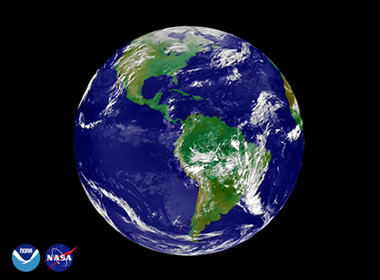
Earth Science is the study of Earth and its neighbors in space. The image above is the first full-hemisphere view of Earth captured in the 21st Century. It was acquired by NOAA's GOES-8 satellite on January 1, 2000 at 12:45 AM Eastern Standard Time. Image by the GOES project.
Introduction
Earth Science is the study of the Earth and its neighbors in space. It is an exciting science with many interesting and practical applications. Some Earth scientists use their knowledge of the Earth to locate and develop energy and mineral resources. Others study the impact of human activity on Earth's environment, and design methods to protect the planet. Some use their knowledge about Earth processes such as volcanoes, earthquakes, and hurricanes to plan communities that will not expose people to these dangerous events.
The Four Earth Sciences
Many different sciences are used to learn about the Earth; however, the four basic areas of Earth science study are: geology, meteorology, oceanography, and astronomy. A brief explanation of these sciences is provided below.
| Earth Scientists Study the Subsurface |
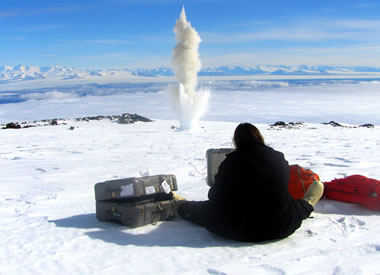
Mapping the inside of a volcano: Dr. Catherine Snelson, Assistant Professor of Geophysics at New Mexico Tech, sets off small explosions on the flank of Mount Erebus (a volcano in Antarctica). Vibrations from the explosions travel into the Earth and reflect off of structures below. Her instruments record the vibrations. She uses the data to prepare maps of the volcano's interior. Photo courtesy of Martin Reed, the National Science Foundation and the United States Antarctic Program. Learn more about what Dr. Snelson and others are doing to learn about Mount Erebus.
Geology: Science of the Earth
Geology is the primary Earth science. The word means "study of the Earth." Geology deals with the composition of Earth materials, Earth structures, and Earth processes. It is also concerned with the organisms of the planet and how the planet has changed over time. Geologists search for fuels and minerals, study natural hazards, and work to protect Earth's environment.
| Earth Scientists Map the Surface |
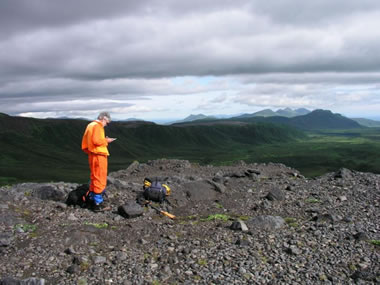
Mapping lava flows: Charlie Bacon, a USGS volcanologist, draws the boundaries of prehistoric lava flows from Mount Veniaminof, Alaska, onto a map. This map will show the areas covered by past lava eruptions and can be used to estimate the potential impact of future eruptions. Scientists in Alaska often carry firearms (foreground) and pepper spray as protection against grizzly bears. The backpack contains food and survival gear, and a two-way radio to call his helicopter pilot. Charlie's orange overalls help the pilot find him on pick-up day. Image by Charlie Bacon, USGS / Alaska Volcano Observatory.
Meteorology: Science of the Atmosphere
Meteorology is the study of the atmosphere and how processes in the atmosphere determine Earth's weather and climate. Meteorology is a very practical science because everyone is concerned about the weather. How climate changes over time in response to the actions of people is a topic of urgent worldwide concern. The study of meteorology is of critical importance in protecting Earth's environment.
| The Hydrologic Cycle - An Earth Science System |
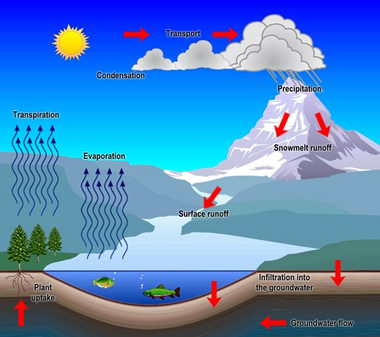
Hydrologic Cycle: Earth Science involves the study of systems such as the hydrologic cycle. This type of system can only be understood by using a knowledge of geology (groundwater), meteorology (weather and climate), oceanography (ocean systems) and astronomy (energy input from the sun). The hydrologic cycle is always in balance - inputs and withdrawals must be equal. Earth scientists would determine the impact of any human input or withdraw from the system. NOAA image created by Peter Corrigan.
Oceanography: Science of the Oceans
Oceanography is the study of Earth's oceans - their composition, movement, organisms and processes. The oceans cover most of our planet and are important resources for food and other commodities. They are increasingly being used as an energy source. The oceans also have a major influence on the weather, and changes in the oceans can drive or moderate climate change. Oceanographers work to develop the ocean as a resource and protect it from human impact. The goal is to utilize the oceans while minimizing the effects of our actions.
Astronomy: Science of the Universe
Astronomy is the study of the universe. Here are some examples of why studying space beyond Earth is important: the moon drives the ocean's tidal system, asteroid impacts have repeatedly devastated Earth's inhabitants, and energy from the sun drives our weather and climates. A knowledge of astronomy is essential to understanding the Earth. Astronomers can also use a knowledge of Earth materials, processes and history to understand other planets - even those outside of our own solar system.
The Importance of Earth Science
Today we live in a time when the Earth and its inhabitants face many challenges. Our climate is changing, and that change is being caused by human activity. Earth scientists recognized this problem and will play a key role in efforts to resolve it. We are also challenged to: develop new sources of energy that will have minimal impact on climate; locate new sources of metals and other mineral resources as known sources are depleted; and, determine how Earth's increasing population can live and avoid serious threats such as volcanic activity, earthquakes, landslides, floods and more. These are just a few of the problems where solutions depend upon a deep understanding of Earth science.
Earth Science Careers
If you are a pre-college student, you can start preparing for a career in Earth science by enrolling in the college preparation program and doing well in all of your courses. Science courses are especially important, but math, writing, and other disciplines are also used by Earth scientists during every working day.
Some universities have Earth Science programs but most offer more specific training in programs such as geology, meteorology, oceanography or astronomy. In these programs you will be required to take some challenging courses such as chemistry, physics, biology and math. Earth science is an integrated science, and professionals in that field must solve problems that require a knowledge of several fields of science.
If you already have a degree in another discipline such as biology, chemistry, geography, or physics, you might be able to go to graduate school and obtain a Master's degree in one of the Earth sciences. That will most likely require taking some undergraduate courses to meet program entry requirements. However, if you have a strong interest in Earth science it is probably worth doing.
At present, job opportunities in many areas of the Earth sciences are better than average. Opportunities in geology are especially good.
Visit the website of a school that offers a geology degree, get in touch with the geology department, let them know you are interested, and make arrangements to visit the campus. Don't be hesitant. Good schools and professors want to be contacted by interested students.
| More General Geology |
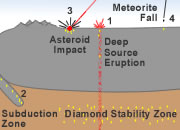 |
Diamonds from Coal? |
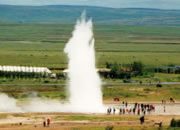 |
What is a Geyser? |
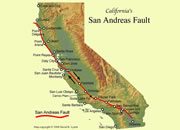 |
What is the San Andreas Fault? |
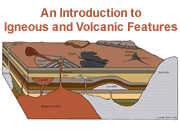 |
Igneous and Volcanic Features |
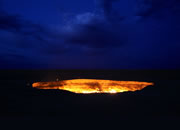 |
The Doorway to Hell |
 |
Topo Maps |
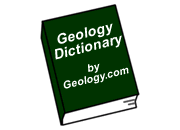 |
Geology Dictionary |
 |
Gifts That Rock |
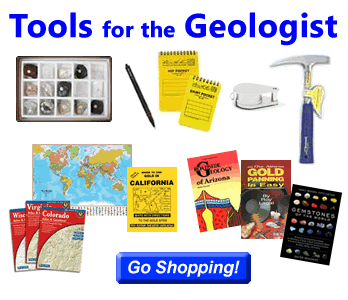
Find Other Topics on Geology.com:
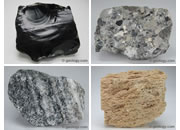
|
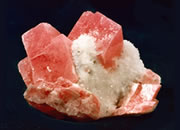
| ||
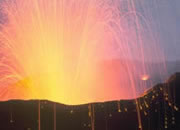
|

| ||
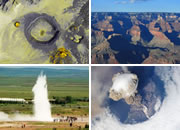
|

| ||
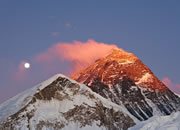
|
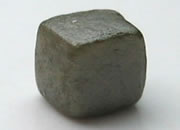
|
